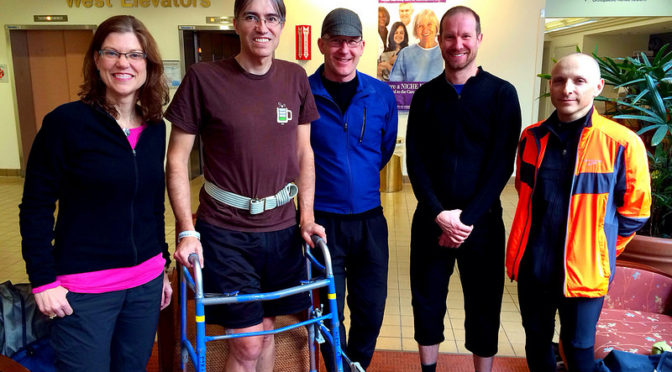Recently, a friend of mine suggested I post a guide for people dealing with orthopedic surgery. After all, it’s traumatic, life-disrupting, frustrating, and mysterious.
As #projectfemur is an orthopedic adventure – and one that is ongoing, with new chapters ahead – I thought that it would be good to get this stuff down in writing. So here, without any further ado, is my basic guide (and it will evolve over time, as I remember more key points):
- Enter with a positive attitude. You’re getting the surgery regardless, so you might as well embrace the situation and enter with optimism, smiles, and a sense of humor.
- Don’t be afraid to ask your doctors tough questions before surgery. They are there to help, and for some people – especially for me – I like to know what’s going to happen. I’ve had some great Q&A sessions with admit nurses, anesthesiologists, X-ray techs, and my surgeons. Some of the questions are totally banal, others are quite serious and complex – and all received thoughtful, appropriate answers.
- During the first 24 to 48 hours after surgery, you likely won’t feel quite like yourself. Anesthesia, opioid pain killers, nerve blocks, and the like wreak havoc with your mind. They can give you a false sense of happiness, can make you queasy, and can even make you do things you would never do when sober. There’s a good reason most hospitals make you sign a document stating that they can’t be held responsible for any decisions you make while under the influence of anesthesia.
- Follow your doctor’s/physical therapist’s recovery prescription to the letter. Don’t rush the recovery. Your body won’t always communicate what’s going on (especially when you are on the high-level pain meds), so it’s best to be conservative and let things heal. Orthopedic surgery is traumatic, and the body responds to trauma by slowing itself down, concentrating its energy on healing things.
- Manage your pain. Trust me on this: it’s always best to be ahead of the pain curve, especially in the early days of recovery. Pain often creates more problems than it solves, including biomechanical compensation that can lead to new or further injuries. And for some people pain is a good indicator of progress in healing, or that a move you’re trying to do isn’t smart. But this isn’t about completely eliminating pain, but managing your pain. So lay off the heavy-duty painkillers as soon as you can, but the non-addictive ones? They’re good to have by your side.
- Get rest. Sleep when your body says it needs to sleep. The rest will help with recovery, and will also help you during your awake periods when you’ll need the energy for PT, day-to-day life, and socializing.
- Eat healthy food before and after the surgery. Sure, have some treats here and there – you will crave and, frankly, need them after all you’ve been through. But it’s best to stick with healthy, balanced, real food meals. Eat complete proteins. Make sure you get all of your necessary vitamins in your diet. Lay off the alcohol for a bit (at least lay off the second drink, and if you are on opioids or high-dose acetaminophen, try and abstain completely). You’ll heal faster, have more energy, and will gain less weight while you’re down.
- Realize that your body will be different after the surgery. Things won’t necessarily work like they did before Your biomechanics will be changed. Accept this as a welcome challenge, because you will get better and learn how to work with your renewed body parts.
- Accept that there can – and likely will – be setbacks. Have patience. Be ready for them, and treat them as speed bumps. Be honest with your friends and loved ones – and most of all, yourself – about the setbacks and related frustrations. They will pass, given time.
- Smile a lot, and have a sense of humor about the situation. Attitude is everything! Honestly, this is possibly the biggest key to maintaining composure and optimism during the throes of recovery. When in doubt, read a favorite pick-me-up book or watch a go-to movie or TV series. For me, the James Bond films were must-see recovery fodder after both of my surgeries.
Like I said earlier, there’s bound to be more – that’s just what I can rattle off right now.
Have any advice? Leave it in the comments!
(The picture at the top is from January 2014, during my recovery from the original #projectfemur surgery, when my friends Mary, Ed, Ryan, and Ted stopped by for a visit.)
















Kody Loveless
4 October 2016 — 17:40
Good advice about not rushing the recovery. I have a hard time following that myself and have needed to get more surgeries because I did not give my body enough time to recover. You need to be patient with your body.
Zequek Estrada
7 October 2016 — 16:16
I completely agree with you that attitude is everything. Orthopedic surgery doesn’t sound like a walk in the park at all. However, it’s for those types of situation that having a sense of humor or at least being around people who make you laugh comes in handy.
Ben Proctor
31 October 2016 — 16:04
I recently found out that I will need surgery and that I’ll need to have an orthopedic doctor for that surgery. I have never had surgery and so I am glad that you posted this advice that will help me a lot. I liked that you mentioned that there will be pain and that you can’t eliminate the pain but managing it is possible. Hopefully, I will recover quickly but I am planning it to take some time. Thanks for the advice.
Jackie Oliver
12 December 2016 — 20:22
I really like what you said about following the doctors and physical therapist’s orders down the the letter. I can only imagine how important that would be while trying to recover from a surgery. In addition to that, I like what you said about making sure you get enough rest after surgery, so that you can recover properly.
Olivia Nelson
28 February 2017 — 18:27
I agree that you would need to get plenty of rest after an orthopedic procedure. I would imagine that rest is the body’s best way to take care of an injury so you should rest whenever you need it. My husband may need orthopedic surgery so if he does he’ll have to remember to rest plenty afterwards.
jresquival
22 March 2017 — 19:54
That’s a good tip to ask questions. Things you understand are less scary and stressful. My hips and back have been hurting for a while, so I think I’ll need to talk to an orthopedic surgeon.
Luke Smith
23 March 2017 — 17:49
I really like that you started your advice with the comment about the importance of having a positive attitude about your surgery. You just made a really good point about how you are going to get the surgery one way or the other so you better be optimistic about it. I feel like finding a surgeon that you feel you can really trust would be one of the best ways to help yourself stay positive.
Dave Anderson
27 March 2017 — 15:06
I have never had surgery of any kind done to my body and so I am nervous to go into the orthopedic surgery that I am going to undergo soon. I appreciate the different tips and things that I can do before and after the surgery to prepare myself. I think that now that I have an idea of what to expect I will be able to feel more confident going into the surgery. Like you said, it is important to follow the doctors orders so I will make sure to go in with a family member so that they can help me to remember the doctors orders.